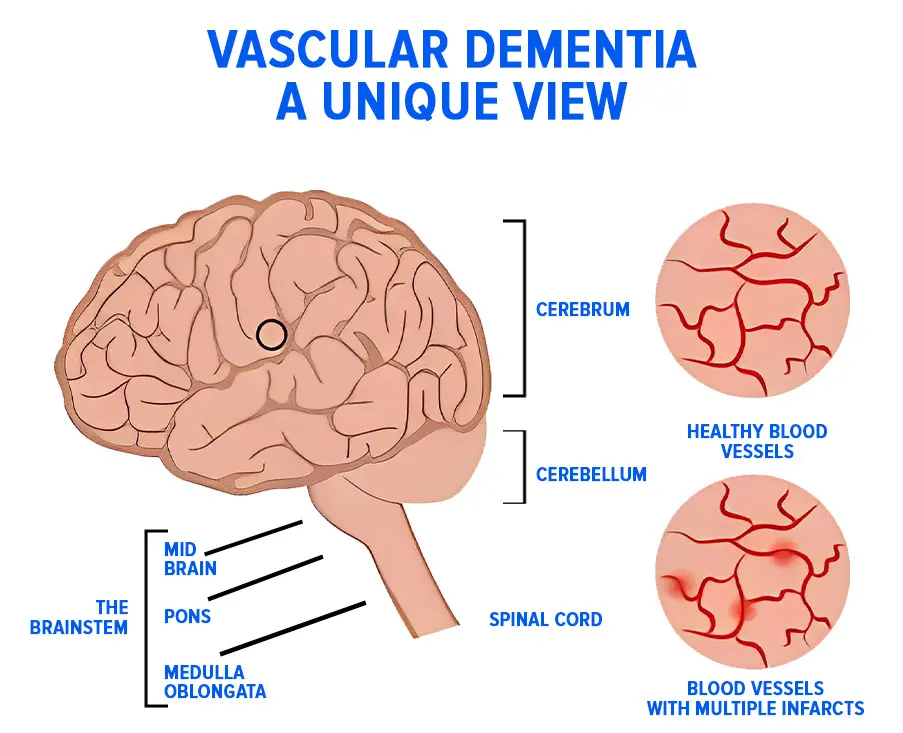Entering the dementia maze is tough for patients, caregivers, and loved ones. Memory loss, cognitive decline, and personality loss weigh on daily living. In this complex neurological terrain, where conventional treatments offer little comfort, new treatments for vascular dementia offer hope. Vascular dementia is often misunderstood and ignored, but it tells its own story.
This kind of dementia is distinct from its more common cousins. Memory lapses are simply one of many misunderstood symptoms and complex issues that require care and understanding.
Vascular Dementia: A Unique View
Vascular dementia is a separate dementia kind. Unlike Alzheimer’s disease, causes cognitive deterioration due to reduced brain blood flow. This form of dementia, often caused by strokes or other brain blood vessel problems, is equally disruptive but requires special knowledge and treatment.
Dementia remedies have been sought relentlessly. Vascular dementia is rising due to an aging population, making innovative therapies necessary. This urgency highlights the importance of researching and adopting innovative vascular dementia treatments.
Understanding Vascular Dementia
Causes and Mechanisms
Which can be caused by stroke, small vessel disease, or cerebral blood vessel disease. Each disruption of blood flow can cause cognitive deterioration in different ways.
Vascular dementia’s sudden start and gradual progression distinguish it from Alzheimer’s disease. Vascular dementia frequently has more severe executive function abnormalities and a unique cognitive decline pattern than Alzheimer’s.
It affects more than cognition. The illness can impair memory, decision-making, attention, and spatial awareness, making daily chores difficult. Changes in social contacts and connections disrupt personal and family dynamics.
Conventional Treatment Options for Vascular Dementia

Traditional vascular dementia management has focused on diverse techniques. These techniques relieve symptoms and decrease disease development.
Traditional Methods
Lifestyle changes, cognitive therapy, and symptomatic management underpin standard treatments. The plan emphasizes healthy living, regular exercise, a balanced diet, and managing vascular risk factors, including hypertension and diabetes.
Cognitive stimulation through diverse activities and therapy may reduce cognitive decline beyond physical health. Cognitive rehabilitation and mental exercises for specific deficiencies assist people in preserving cognitive function and independence.
Prior Treatment Limitations
Conventional treatments can provide some relief and assistance, but they seldom stop or decrease vascular dementia progression. Their efficacy varies greatly among individuals, underlining the need for more tailored and novel therapies.
Advances in Vascular Dementia Treatment
New Drug Treatments for Vascular Dementia
New drugs designed to target vascular dementia’s particular pathophysiology offer hope for better treatments.
Several drugs may treat vascular dementia. These medications try to reduce symptoms and delay disease progression. Some of these drugs increase brain blood flow, while others target neuroprotection or cognitive function pathways. Cholinesterase inhibitors and memantine, used to treat Alzheimer’s, can help manage vascular dementia cognitive symptoms.
The Efficacy and Side Effects
These drugs show promise, but results vary. They may also cause gastrointestinal difficulties or heart issues. The delicate balance between benefits and hazards requires careful assessment and tailored therapy.
Comparative Analysis: Treatment Options for Dementia
Beyond vascular dementia, it’s important to research other dementia treatments. Alzheimer’s disease, Lewy body dementia, and frontotemporal dementia share symptoms. Cholinesterase inhibitors, for example, are used across kinds, but their success depends on the disease.
The variety of therapies brings obstacles and opportunities. Each dementia kind has unique symptoms and progressions, making personalized therapies difficult. However, this variability allows for novel techniques and combination medicines that target several routes or mechanisms for a more thorough treatment.
Dementia treatment is complicated, and the kind and stage of dementia, pharmaceutical response, and side effects should all be considered. Healthcare providers, researchers, and caregivers must work together to navigate this complicated landscape.
Vascular Dementia Treatment Future
Vascular dementia treatment is promising due to relentless research and clinical studies that attempt to revolutionize this problematic condition.
The scientific community continues to study vascular dementia through research and clinical trials. These efforts range from examining illness processes to developing new treatments for vascular dementia that could change the field.
Several advances could change vascular dementia care. From novel medication therapies targeting specific pathways to non-pharmacological treatment using brain stimulation approaches, emerging therapies show promise.
These efforts offer hope for better vascular dementia treatments addressing symptoms and causation. It may improve the quality of life and cognitive well-being for people with this illness.
Conclusion
Research and support for vascular dementia patients and their families are vital to expanding treatment options. The constant pursuit of vascular dementia therapy alternatives represents a profound commitment to changing millions of lives. Each study and innovation advance improves outcomes and quality of life for persons confronting these difficulties.
Despite these advances, there remains unshakable support and understanding for persons with vascular dementia. Find refuge in rising knowledge and dedicated healthcare professionals and researchers trying to make a difference.
Our collaborative support for research and clinical trials is crucial. Inform yourself, raise awareness, and consider supporting research. Together, we can advance vascular dementia treatments and a better future.
Read More: 10 Essential Steps to Create a Care Plan for Dementia Patients
FAQ's
The beginning of vascular dementia can be rapid, and its course frequently involves gradual cognitive impairment. Strokes and vascular disorders cause brain blood flow problems, unlike Alzheimer’s disease.
Yes, vascular dementia drugs can treat symptoms and decrease progression. Neuroprotection, blood flow, and cognitive function are common targets of these drugs. Their efficacy and side effects vary by person.
Lifestyle changes matter. Encourage heart-healthy habits including frequent exercise, a balanced diet, and managing vascular risk factors like hypertension to slow vascular dementia and increase well-being.
New medication therapies targeting specific pathways and innovative non-pharmacological methods like brain stimulation are being studied in clinical trials. These advances could improve therapeutic efficacy and targeting.
Educating about research, participating in clinical trials if appropriate, and campaigning for awareness and support can advance therapies. Progress also depends on supporting research and patient communities.

